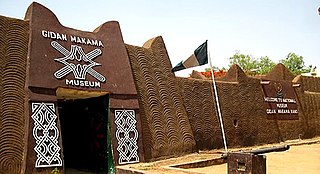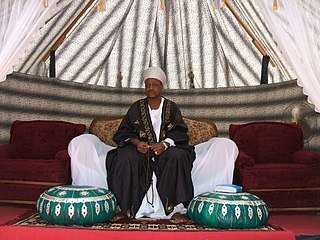Related Research Articles

Sokoto is a major city located in extreme north-western Nigeria, near the confluence of the Sokoto River and the Rima River. As of 2006, it has a population of over 427,760. Sokoto is the modern-day capital of Sokoto State and was previously the capital of the north-western states. Modern Sokoto is known for trading sheepskins, cattle hides, leather crafts, kola nuts and goatskins.

The Jihad of Usman dan Fodio was a religio-military conflict in present-day Nigeria and Cameroon. The war began when Usman dan Fodio, a prominent Islamic scholar and teacher, was exiled from Gobir by King Yunfa, one of his former students.
Ikara is a town and local government area (LGA) in Kaduna State, northern Nigeria, located around (85km) north-east from the city of Zaria. Ikara as an LGA consists of these towns its located between 10°2¹ to 11°5¹ north and villages: Ikara, Malikachi, Furana, Danlawan, Kurmin Kogi, Janfalan, Auchan, Paki, and Pala.

Nigerian literature may be roughly defined as the literary writing by citizens of the nation of Nigeria for Nigerian readers, addressing Nigerian issues. This encompasses writers in a number of languages, including not only English but Igbo, Urhobo, Yoruba, and in the northern part of the county Hausa and Nupe. More broadly, it includes British Nigerians, Nigerian Americans and other members of the African diaspora.

Amina was a Hausa historical figure in the city-state Zazzau, in what is now in the north-west region of Nigeria. She might have ruled in the mid-sixteenth century. A controversial figure whose existence has been questioned by some historians, her real biography has been somewhat obscured by subsequent legends and folk tales.

The Bayero University Kano (BUK) is a university situated in Kano, Kano State, Nigeria. It was founded in 1975, when it was renamed from Bayero University College and upgraded from University College to University. It is the first university in Kano State, North-western Nigeria.

Hausa Kingdoms, also known as Hausa Kingdom or Hausaland, was a collection of states started by the Hausa people, situated between the Niger River and Lake Chad. Hausaland lay between the Western Sudanic kingdoms of Ancient Ghana, Mali and Songhai and the Eastern Sudanic kingdoms of Kanem-Bornu. Hausaland took shape as a political and cultural region during the first millennium CE as a result of the westward expansion of Hausa peoples. They arrived to Hausaland when the terrain was converting from woodlands to savannah. They started cultivating grains, which led to a denser peasant population. They had a common language, laws and customs. The Hausa were known for fishing, hunting, agriculture, salt-mining, and blacksmithing.

The Hausa are a native ethnic group in West Africa. They speak the Hausa language, which is the second most spoken language after Arabic in the Afro-Asiatic language family. The Hausa are a culturally homogeneous people based primarily in the Sahelian and the sparse savanna areas of southern Niger and northern Nigeria respectively, numbering around 86 million people, with significant populations in Benin, Cameroon, Ivory Coast, Chad, Central African Republic, Togo, Ghana, as well as smaller populations in Sudan, Eritrea, Equatorial Guinea, Gabon, Senegal, Gambia. Predominantly Hausa-speaking communities are scattered throughout West Africa and on the traditional Hajj route north and east traversing the Sahara, with an especially large population in and around the town of Agadez. Other Hausa have also moved to large coastal cities in the region such as Lagos, Port Harcourt, Accra, Abidjan, Banjul and Cotonou as well as to parts of North Africa such as Libya over the course of the last 500 years. The Hausa traditionally live in small villages as well as in precolonial towns and cities where they grow crops, raise livestock including cattle as well as engage in trade, both local and long distance across Africa. They speak the Hausa language, an Afro-Asiatic language of the Chadic group. The Hausa aristocracy had historically developed an equestrian based culture. Still a status symbol of the traditional nobility in Hausa society, the horse still features in the Eid day celebrations, known as Ranar Sallah. Daura is the cultural center of the Hausa people. The town predates all the other major Hausa towns in tradition and culture.

Karai-karai is a language spoken in West Africa, most prominently North eastern Nigeria. The number of speakers of Karai-karai is estimated between 1,500,000 to 1,800,000 million, primarily spoken by the ethnic Karai-Karai people. It is an Afro-Asiatic language spoken principally in Nigeria with communities in Bauchi State, Yobe State, Gombe State and other parts of Nigeria. Many Karai-karai words share a common origin with the Northwest Semitic languages of Hebrew and Arabic. The Karai-karai language is most closely related to the Ngamo and Bole languages which are both considered derivatives of the Karai-karai language.

Gidan Makama Museum Kano or Kano Museum is a museum in Kano, Nigeria. This building served as temporary palace of Sarakunan Hausa of Kano before the current palace Gidan Rumfa was constructed in the 15th century The museum has a significant collections of arts, crafts and items of historic interest related to the Kano area. Located in a 15th-century historical building, which is recognised as a National Monument by the Government of Nigeria. The museum is divided into 11 galleries, each with their own centre of focus. Galleries include the Zaure or the main entrance hall with displays of traditional materials, city walls and maps of Kano, the history of statehood, Kano in the 19th century, the Civil War, economy, industry and music.

Balaraba Ramat Yakubu is a Nigerian author who writes in Hausa. She is a leader in the genre of littattafan soyayya or "love literature", and one of the very few Hausa-language writers whose work has been translated into English. She has also worked as a screenwriter, producer, and director of Kannywood films. Her stories have focused on issues such as forced marriages and women's education.

Bilkisu Yusuf, also known as Hajiya Bilkisu Yusuf,, was a Nigerian journalist, columnist and editor for prominent newspapers in Abuja, Kano and Kaduna, Nigeria. She is known in Nigeria for being the first woman to direct a national newspaper operation and served as editor for two more. She was a Hausa, Muslim, feminist, of Yoruba descent and advocate for interfaith society, who was known for being an adviser to the Nigerian President on International Affairs and the founding of NGOs, such as Women In Nigeria (WIN) and the Federation of Muslim Women's Association (FOMWAN). Yusuf was killed in the 2015 Mina stampede while on Haj in Mecca, Saudi Arabia.
Ibrahim Sheme is a bilingual Nigerian writer, journalist, filmmaker, and publisher. He worked as editor and correspondent of many Nigerian newspapers, including Leadership, The Tide, New Nigerian, The Reporter, and Hotline Magazine. He also authored the official biography of the number two man in the military government of General Olusegun Obasanjo, the late Major-General Shehu Musa Yar’Adua, and the official biography of the leading Hausa musician and singer, the late Mamman Shata. He was the pioneer editor of Blueprint Newspaper and later its editor-in-chief. Sheme has been the Director of Media and Publicity at the National Open University of Nigeria since 2016

Abdalla Uba Adamu is a Nigerian academic, educator, publisher, filmmaker, ethnomusicologist, and media scholar. He hold double professorships in Science Education (1997) and Media and Cultural Communication (2012).
Kaduna Book and Arts Festival, also known as KABAFEST, is an annual literary, cultural, and art event in Kaduna State, Nigeria that took place for the first time in July, 2017. It was organized by Book Buzz Foundation, who also organizes the annual Aké Arts and Book Festival, in collaboration with the Kaduna State Government and the Gusau Institute. It was also the first book festival that occurs annually in northern Nigeria.

Hafsat Ahmad Idris is a Nigerian film actress in the Kannywood film industry. She participated in her first movie called Barauniya (2016). She won the 2019 female actress award.
Gates of Hausa kingdoms are gates or walls (ganuwa) that formerly enclosed Hausa kingdoms. In ancient times, each kingdom was enclosed with a wall that contained various gates. During battles, the gates were closed as a war strategy. Each gate has a name and a gatekeeper. In the past, especially at night, the gatekeeper was in charge of a single gate at all time. All of the gates are assigned to a single person today.

Khalifa Sheikh Qaribullah Sheikh Muhammad Nasir Kabara Al-Malikiy, Al-Ash’ariy, Al-Qadiriy is the leader of the Qadriyyah Sufi Movement in Nigeria and the West African region. He became the Khalifa in 1996 after the death of his father, Sheikh Muhammad Nasir Kabara. With adherents stretching from Chad basin to the Senegambia, the Qadriyyah Tariqa is the most focused concentration of Sufi adherents in post-colonial Africa.
Jekadefari Area of Gombe State: is the combination of two different words "jeka" is a Hausa word meaning follow and "defari" meaning white. Jekadefari means "follow the white men". It was the area that white men settled then after they conquered the emir of Gombe in 1903.
References
- ↑ Adamu, Yusuf. "Interview with Hafsat Abdulwaheed". African Writer. Retrieved 8 December 2016.
- 1 2 Giaimo, Cara. "How Nigerian Romance Novelists Sneak Feminism Into Their Plots". Atlas Obscura.
- 1 2 3 4 Muhammad, Muhammad Kabir (30 November 2016). "Mata 100: Yadda Hafsat Abdulwaheed ta kalubalanci gwamna" . Retrieved 8 December 2016.
- ↑ Yusuf, Adamu. "Interview with Hafsat Abdulwaheed". African Writer. African Writer. Retrieved 8 December 2016.